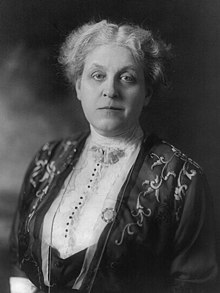Carrie Chapman Catt
| Carrie Chapman Catt | |
|---|---|
 |
|
| Born |
Carrie Clinton Lane January 9, 1859 Ripon, Wisconsin |
| Died | March 9, 1947 (aged 88) New Rochelle, New York |
| Resting place | Woodlawn Cemetery |
| Education | Iowa State University (1880) |
| Parent(s) | Lucius Lane Maria Louisa Clinton |
Carrie Chapman Catt (January 9, 1859 – March 9, 1947) was an American women's suffrage leader who campaigned for the Nineteenth Amendment to the United States Constitution, which gave U.S. women the right to vote in 1920. Catt served as president of the National American Woman Suffrage Association and was the founder of the League of Women Voters and the International Alliance of Women. She "led an army of voteless women in 1919 to pressure Congress to pass the constitutional amendment giving them the right to vote and convinced state legislatures to ratify it in 1920" and "was one of the best-known women in the United States in the first half of the twentieth century and was on all lists of famous American women".
Catt was born Carrie Clinton Lane in Ripon, Wisconsin, the daughter of Maria Louisa (Clinton) and Lucius Lane. Catt spent her childhood in Charles City, Iowa. She moved to Iowa at the age of seven where she began school. As a child, Catt was interested in science and wanted to become a doctor. After graduating from high school, she enrolled at Iowa State Agricultural College (now Iowa State University) in Ames, Iowa.
Catt's father was initially reluctant to allow her to attend college, but he relented, contributing only a part of the costs. To make ends meet, Catt worked as a dishwasher, in the school library, and as a teacher at rural schools during school breaks. Catt’s freshman class consisted of 27 students; six of whom were female. Catt joined the Crescent Literary Society, a student organization aimed at advancing student learning skills and self-confidence. Because only men were allowed to speak in meetings, Catt defied the rules and spoke up during a male debate. This started a discussion about women’s participation in the group, and ultimately led to women gaining the right to speak in meetings. Catt was also a member of Pi Beta Phi, started an all girls' debate club, and advocated for women's participation in military drill.
...
Wikipedia
